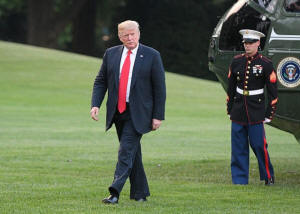|
Trump convenes election security meeting
as hacking looms
 Send a link to a friend
Send a link to a friend
 [July 28, 2018]
WASHINGTON (Reuters) - U.S.
President Donald Trump will convene his national security advisers on
Friday for a high-level meeting on election security, less than four
months until Americans vote to determine whether his fellow Republicans
maintain control of Congress. [July 28, 2018]
WASHINGTON (Reuters) - U.S.
President Donald Trump will convene his national security advisers on
Friday for a high-level meeting on election security, less than four
months until Americans vote to determine whether his fellow Republicans
maintain control of Congress.
The White House meeting comes amid new accusations of Russian meddling
in U.S. elections. On Thursday, Democratic Senator Claire McCaskill was
identified as the target of a hacking attempt ahead of the November
midterm elections. A top Microsoft official last week said Russian
hackers have targeted at least three candidates but did not name them.
Questions persist over whether U.S. states are prepared to thwart cyber
attacks even as debate rages over alleged Russian interference in the
2016 presidential election, which Trump won.
The stakes in the midterm elections are high. Republicans hold
majorities in both the House of Representatives and the Senate, but if
historical patterns hold true, Democrats, as the party out of power,
could gain ground in the contests.
U.S. intelligence agencies have concluded that Russia interfered in the
2016 presidential election through a campaign of hacking and
disinformation to try to help elect Trump.

The U.S. Special Counsel's Office is investigating Russian actions and
any potential collusion with Trump's campaign. The probe has so far
resulted in multiple indictments and guilty pleas by several Trump
associates. Several congressional committees also have opened
investigations.
Russia has denied any interference while Trump has denied collusion and
blasted the investigation as a "witch hunt," a sentiment he tweeted
again on Friday ahead of his meeting.
Trump has alternated between citing Russian President Vladimir Putin's
denials and saying that he backs the American intelligence community's
findings.
U.S. Special Counsel Robert Mueller earlier this month indicted 12
Russian officers from Russia's military intelligence agency, the GRU. In
February, Mueller charged 13 Russians and three Russian companies in an
elaborate conspiracy to interfere in the election.
Tom Burt, vice president of customer security and trust at Microsoft
Corp, last week told the Aspen Security Forum the company uncovered
phishing activity targeting campaign staffers. Microsoft believed the
effort was originated by a group associated with GRU officers, he said.
On Thursday, the Daily Beast identified McCaskill, a Missouri Democrat
who has been critical of Trump and Putin, as the target of an
unsuccessful hacking attempt.
[to top of second column]
|

President Donald Trump walks from Marine One as he returns to the
White House in Washington, U.S., July 26, 2018. REUTERS/Mary F.
Calvert

"Russia continues to engage in cyber warfare against our democracy,"
McCaskill said on Thursday. "While this attack was not successful,
it is outrageous that they think they can get away with this."
A spokesman for McCaskill, whose tough re-election bid is one of a
handful of critical races in the narrowly divided Senate, did not
respond to request for comment on Friday.
The United States already has imposed sanctions on Russia, and
Congress is considering additional penalties in case U.S.
authorities determine the Kremlin has meddled again.
Congress also is grappling with funding to shore up election systems
for U.S. states, which conduct elections. U.S. lawmakers earlier
approved $380 million to safeguard systems, but this month rejected
a Democratic push to provide more funds.
Earlier on Friday, U.S. Defense Secretary Jim Mattis told reporters
at the Pentagon the administration was taking steps to protect the
elections from interference but did not provide details.
"Rest assured there are actions underway to protect our elections or
to expose any external – any, by anybody - external efforts to
influence the American public," Mattis said.
Twenty-one states were targeted in 2016, although there was no
evidence that voted were changed, according to DHS, which unveiled
its new cyber security strategy earlier this year.
Trump, offering no evidence, this week said he believed Russia will
seek to boost Democrats ahead of the November election, rather than
target his fellow Republicans.
(Writing by Susan Heavey and Eric Beech; Additional reporting by
Kara Carlson, Phil Stweart, Joseph Menn; Editing by Dan Burns, Bill
Trott and Jonathan Oatis)
[© 2018 Thomson Reuters. All rights
reserved.]
Copyright 2018 Reuters. All rights reserved. This material may not be published,
broadcast, rewritten or redistributed.
Thompson Reuters is solely responsible for this content.
 |